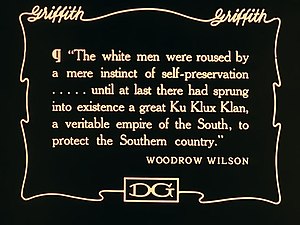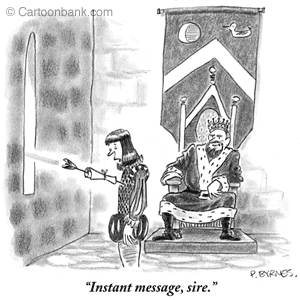Thursday, March 02, 2006
After-Birth of a Nation: Peace, Love, and Segregation?
 Last night I rode the beast, D.W. Griffith's conflictive, divisive 1915 groundbreaking masterpiece, "Birth of a Nation, " that is technically visionary but repugnant in the racism of its content and conviction. "Birth" is technically the precursor of film as we know it today, the author of hundreds of filiming innnovations, and the movie that put the US on the map of art film. It was the first lengthy (3 hour) film that told an epic story, and practically invented the close up, the pan shot, parallel filming for suspense, and many other time-honored tools of the trade. But the film's final 2/3 are lionize the Ku Klux Klan for rescuing the South from the humiliation and tyranny of having to treat African-Americans as equals. Incredibly, the movie, after defeating the former slaves and subduing them, ends with gushy prose about peace and love.
Last night I rode the beast, D.W. Griffith's conflictive, divisive 1915 groundbreaking masterpiece, "Birth of a Nation, " that is technically visionary but repugnant in the racism of its content and conviction. "Birth" is technically the precursor of film as we know it today, the author of hundreds of filiming innnovations, and the movie that put the US on the map of art film. It was the first lengthy (3 hour) film that told an epic story, and practically invented the close up, the pan shot, parallel filming for suspense, and many other time-honored tools of the trade. But the film's final 2/3 are lionize the Ku Klux Klan for rescuing the South from the humiliation and tyranny of having to treat African-Americans as equals. Incredibly, the movie, after defeating the former slaves and subduing them, ends with gushy prose about peace and love. The negative stereotypes and defamation are shocking - still, remember that this is 1915 - women can't vote, minorities are segregated, and many in the audience actually lived through the Civil War and/or Reconstruction, with all the bitterness and resentment that those blood-drenched events can engender. Two years later, a world war would finally put North or South on the same (winning) team. Take this movie as documentation of how far we have come. The NAACP, to its credit, picketed this film from day one, and in each revival, whereever it was shown. Thanks to DVD and Netflix, you can peruse this essential moment of film history in the privacy of your own home.
The negative stereotypes and defamation are shocking - still, remember that this is 1915 - women can't vote, minorities are segregated, and many in the audience actually lived through the Civil War and/or Reconstruction, with all the bitterness and resentment that those blood-drenched events can engender. Two years later, a world war would finally put North or South on the same (winning) team. Take this movie as documentation of how far we have come. The NAACP, to its credit, picketed this film from day one, and in each revival, whereever it was shown. Thanks to DVD and Netflix, you can peruse this essential moment of film history in the privacy of your own home. Woodrow, how could you? Apparently he could... President Wilson, that historical over-reacher and cold fish, was no friend of African-Americans. Nothing like a blatantly racist film that supports itself with quotes of the then-sitting President of the United States.
Woodrow, how could you? Apparently he could... President Wilson, that historical over-reacher and cold fish, was no friend of African-Americans. Nothing like a blatantly racist film that supports itself with quotes of the then-sitting President of the United States.
this entry's permalink
Comments:
Post a Comment

